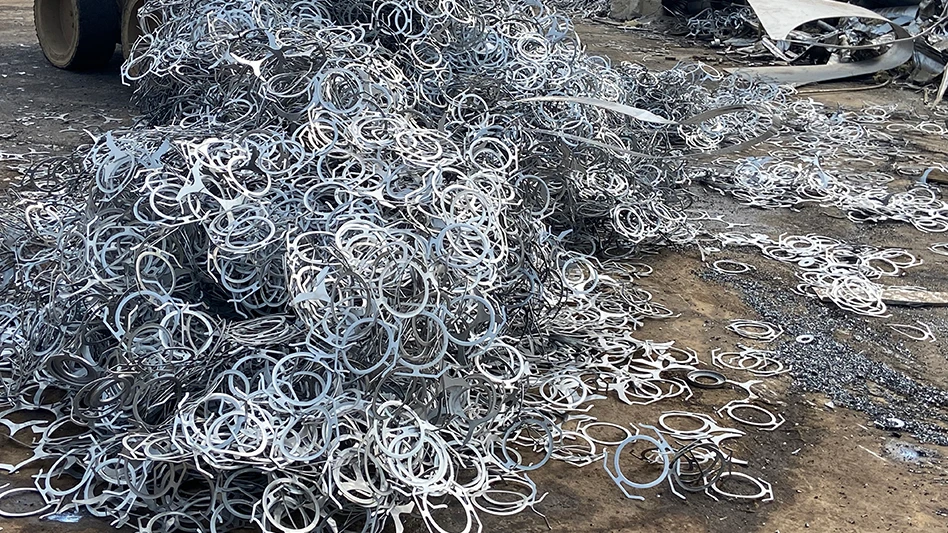
Recycling Today archives
An effort by the Aluminium Association of India (AAI), which represents primary producers, to boost a tax placed on imported aluminum scrap has not gone unnoticed by the Material Recycling Association of India (MRAI).
The Mumbai-based MRAI has released a statement requesting government policymakers not only resist the call to raise the scrap import tax, but saying they should make zero percent duty on metal scrap until the nation reaches a point where it is self-sufficient in the material.
The recycling organization portrays Indian aluminum demand growing rapidly because of increases in the nation’s population, urbanization and industrialization. “It is an important metal for high-value demand segments like infrastructure—power, transportation, railways, aerospace, building and Construction, renewable energy—and consumer durables,” the group says.
Recycled-content aluminum production is the sector’s fastest growing, and environmental concerns mean it should stay that way, MRAI adds.
“Domestic primary aluminum manufacturers have the highest carbon intensity among global producers, with emissions of 14 metric tons of CO2 equivalent per metric ton of aluminum, whereas [the] recycled aluminum industry emits only 0.3 metric tons of CO2 per ton of recycled aluminum products,” the group says, noting higher usage of scrap is another lever for decarbonization.
The group acknowledges India’s secondary producers currently rely on imports, but argues that situation will abate as India’s economy industrializes and matures. “As aluminum has a long life cycle, there is always a long gap between a recycled product entering into services and its end of life,” the MRAI says.
“Given India’s fast paced growth, under the leadership of Prime Minister Modi, India is consuming much more materials than is available from end-of-life products. Hence, the recycling industry relies on imports of metal scrap to meet the shortfall to ensure [a] sustainable business.”
“We strongly urge the government must provide a level playing field for both primary and secondary sector, as we believe both are vital contributors to the national economy," MRAI President Sanjay Mehta adds.
”For example, if customs duties are applicable on import of scrap, then commensurate export duties on the basis of total cost to country on primary products should also be levied. Further, the standards on scrap material should be formed after consultation with recycling aluminum industry, and to support recycling it should be industry-friendly and not restrictive in nature, else it will have a negative impact on the aluminum recycling industry which is [trying] to minimize carbon emissions.”
Mohan Agarwal, managing director of secondary producer CMR Green Technologies Ltd., adds, “While recycling does not generate any liquid or solid effluents and has a CO2 imprint of only 0.3 metric tons per ton, every 1 metric ton of primary aluminum generates 14 metric tons of CO2 emissions and 8 metric of hazardous landfill [material]. Therefore, as a service to future generations, we must promote recycled aluminum over primary aluminum.”
Dhawal Shah of Mumbai recycling and trading firm Metco Ventures LLP says, “India’s secondary aluminum metal manufacturing sector is playing a larger role in the circular economy, sustainability and low-carbon economy to minimize CO2 emissions. Despite this, primary aluminum producers often suggest to impose higher import duties on aluminum scrap, and also demand scrap-unfriendly [import] specifications [and] insufficient collection systems which can hinder market growth.”
The MRAI also says regions and countries including the European Union, the United Arab Emirates and South Africa have recognized its value and instead have legislated to prevent it from being exported. “This is going to become more challenging after the execution of [a revised] EU Waste Management Rule that will be effective from Jan 1, 2025, for non-OECD countries," it says.
Both the growth of India’s metals sector as well as the trade challenges looming are likely to be topics of discussion when the MRAI meets for its 2024 Exposition & Convention in Kolkata, India, from Jan. 23-25.
Latest from Recycling Today
- BMW Group, Encory launch 'direct recycling’ of batteries
- Loom Carbon, RTI International partner to scale textile recycling technology
- Goodwill Industries of West Michigan, American Glass Mosaics partner to divert glass from landfill
- CARI forms federal advocacy partnership
- Monthly packaging papers shipments down in November
- STEEL Act aims to enhance trade enforcement to prevent dumping of steel in the US
- San Francisco schools introduce compostable lunch trays
- Aduro graduates from Shell GameChanger program





